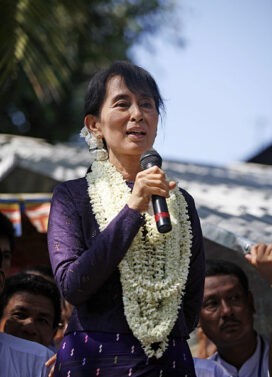Aung San Suu Kyi Biography
Aung San Suu Kyi is a Nobel Prize-winning peace activist who was detained by the military dictatorship of Myanmar from 1989 to 2010, with only brief periods of freedom, then elected to the parliament in 2012 and is now the leader of her party, the National League for Democracy (NLD). Constitutionally barred from the presidency (because her sons are British citizens), she became the de facto leader of Myanmar in 2016.
She is the daughter of Burmese General Aung San, a national hero who helped negotiate Burma’s independence from Britain (which took place in 1948). General Aung San was assassinated in July of 1947, and two year-old Aung San Suu Kyi left Burma to live and study in India and the United Kingdom.
In 1988 she returned to Burma and led the NLD in opposition to the ruling military regime. Inspired by the non-violent practices of Mohandas Gandhi and Martin Luther King, Jr., she became a national hero and an international celebrity. She was placed under house arrest in 1989, but the NLD still convincingly won popular elections in 1990.
The military junta refused to give up power and held Aung San Suu Kyi under house arrest until 1995. While detained she was given the 1991 Nobel Prize for peace. She was held again from September 2000 until May 2002, during which time the NLD was having secret negotiations with the junta in an effort to break the political deadlock.
She was again detained in May of 2003 and taken into “protective custody” as confrontations between the NLD and government supporters increased. Despite diplomatic pressure and international pleas for her release, the ruling military junta announced an extension of her house arrest for an indefinite period in 2006, and again in 2009.
She was finally released on November 13, 2010. On April 1 of 2012, the NLD announced that Aun San Suu Kyi had won a by-election and would become a member of Myanmar’s Parliament. Her advisor Htin Kyaw became the president in 2016, though he was recognized as a proxy for Aung San Suu Kyi herself.
Aung San Suu Kyi has been under international pressure to solve human rights violations against Myanmar’s Rohingya Muslim population (a number of her international peace awards were revoked as a result), while also fending off the military forces that oppose her.
In February of 2021 military units led by Min Aung Hlaing arrested Suu Kyi and other elected leaders and took control of the government, declaring a state of emergency and detaining Suu Kyi and dozens of others.
In part, the military seized power citing election fraud. By November of that year, Suu Kyi was convicted on political charges and sentenced to two years in detention.
In December of 2022 she was further sentenced to seven more years, bringing her prison sentence to a total of 33 years.
Extra credit
Aung San Suu Kyi is sometimes called Daw Suu (or “Auntie Suu”) and Amay Suu (“Mother Suu”) by her supporters… Burma was renamed Myanmar in 1989 by the ruling military party, the State Law and Order Restoration Council (later called the State Peace and Development Council).

